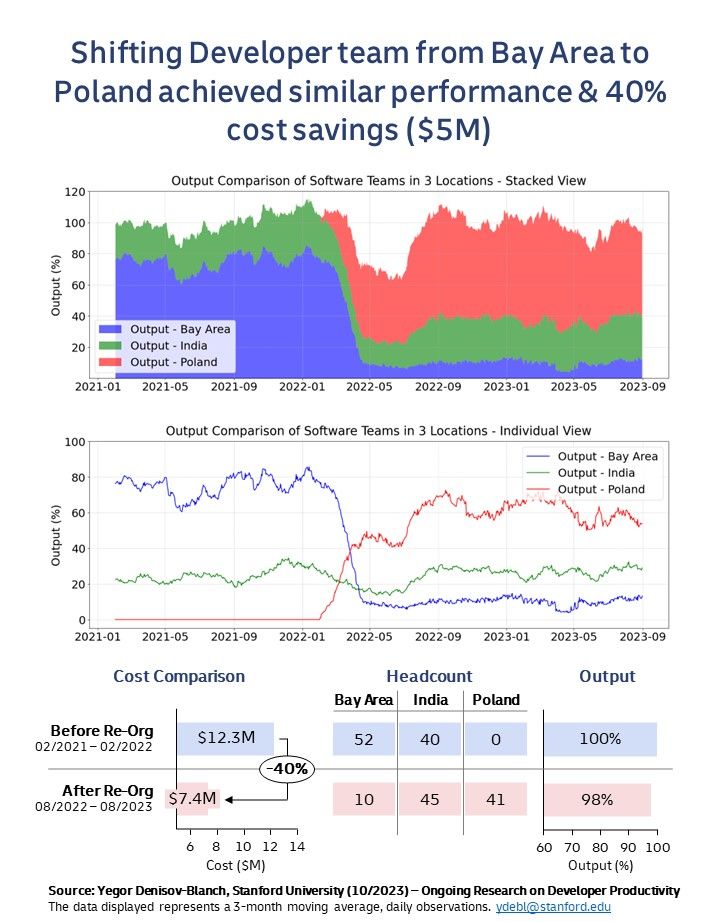This article delves into the strategic advantages of building a remote software development team in Poland. We will explore the tangible benefits that this Central European country offers, backed by compelling data and a case study validated by Stanford research. From cost savings to access to a skilled talent pool, Poland’s allure is multifaceted and persuasive.
Introduction
The advancement of digital metamorphosis sets the tempo for the evolution of business, and the pursuit of groundbreaking and economically viable software development solutions has prompted many to investigate the potential of remote teams. Amidst this worldwide tendency, Poland has surfaced as a guiding light of promise, providing a distinctive blend of technological expertise and economic advantage.
The practice of offshoring software development is not a novel notion, but its favor has escalated in recent times. Companies across the globe are actively searching for methods to enhance efficiency and reduce expenses without compromising excellence. In this context, Poland, with its robust educational system and flourishing tech sector, presents a persuasive proposal for enterprises striving to accomplish these goals.
As we plunge into the intricacies of offshoring, we will also address the potential risks and obstacles, furnishing a comprehensive perspective for decision-makers. Furthermore, we will delineate strategic considerations and pragmatic actions for those weighing the establishment of a distant software team in Poland, ensuring a smooth transition.
Advantages of Building a Remote Software Development Team in Poland
Establishing a remote software development team in Poland presents a multitude of strategic advantages that can significantly amplify the operational effectiveness and cost efficiency of enterprises. Here are seven pivotal benefits:
- Cost Savings: One of the most compelling rationales to consider Poland for your software development needs is the substantial cost-effectiveness. With the mean expense for a software developer in Poland being markedly lower than in numerous Western countries, companies can diminish their entire expenditure while still accessing top-notch services.
- Vast Talent Pool and Access to Skilled Talent: Poland boasts an extensive talent pool of highly educated and skilled software developers. The nation’s robust emphasis on STEM (science, technology, engineering, and mathematics) education has yielded a labor force that is not solely technically adept but also steadily expanding, ensuring that enterprises have access to a diverse range of expertise.
- Convenient Time Zone: Poland’s time zone synchronizes well with most European nations and offers manageable overlaps with North American business hours, facilitating smoother communication and collaboration across distinct regions.
- Cultural Compatibility: Polish developers are renowned for their robust work ethic and adaptability, rendering them culturally harmonious with numerous Western business methodologies. It eases the integration of remote team members and nurtures a productive working environment.
- Government Incentives and Support Programs: The Polish government actively bolsters the tech industry through diverse incentives and programs. For instance, the ‘Polish Investment and Trade Agency’ extends comprehensive aid to investors, the ‘R&D Relief’ program furnishes tax incentives for research and development undertakings, and the ‘Innovative Economy Operational Programme’ strives to boost the competitiveness of the Polish economy through innovation.
- High-Quality Infrastructure: Poland has invested substantially in its IT infrastructure, ensuring that remote teams have access to contemporary facilities and high-speed internet, which is pivotal for software development and remote collaboration.
- Language Proficiency: The elevated degree of English proficiency among Polish software engineers guarantees lucid communication, which is imperative for the success of any remote team.
These advantages collectively render Poland an enticing destination for enterprises seeking to establish a remote software development team. The combination of cost efficiency, a proficient workforce, and supportive governmental policies creates an environment conducive to thriving software development operations.
Case Study: Stanford Research on Offshoring Software Development Team to Poland
The decision to reposition a software development team to a lower-cost region can be daunting, but when executed meticulously and supported by data, it can yield significant advantages. A case study rooted in research from Stanford University conducted by Yegor Denisov-Blanch presents a compelling narrative of such a strategic maneuver.
Contextual Information
A technological enterprise encountered the dilemma of mounting expenses in the Bay Area. With an average yearly expense of over $200,000 per engineer, the financial pressure was substantial. In a daring maneuver, the enterprise opted to revamp their roughly 90-person team. They substituted 42 Bay Area engineers with 41 in Poland, where the average expense was $80,000, and 5 in India, at $35,000 per engineer.

Financial Consequences
This strategic adjustment resulted in a remarkable reduction in annual engineering costs, from $12.3 million to $7.4 million. The cost-effectiveness of the initiative was evident, but the genuine measure of success lay in the performance of the new team.
Efficiency Examination
Following a transitional phase of approximately six months, the performance of the new team was evaluated. Both quantitative and qualitative metrics were taken into account, and the outcomes were encouraging. The performance of the new team nearly equaled that of the original team, indicating that the caliber of work was upheld despite the reduced costs.
Methodology
The efficiency of the developers was assessed employing an innovative algorithm formulated from Stanford’s research. This algorithm scrutinized the functional aspects of source code across Git repositories, commit by commit. It furnished a language-agnostic and style-independent metric, enabling an impartial evaluation of both individual developers and the team as a whole.
Implications
The case study illustrates that relocating a software development team to a country like Poland can be an economical strategy without compromising on output quality. It highlights the significance of depending on objective data when making high-stakes decisions and cautions against conventional metrics that may not accurately reflect developers’ productivity.
Potential Risks and Challenges
While the advantages of constructing a remote software development team in Poland are numerous, it is imperative to recognize and brace for potential risks and challenges that may emerge. Here are some pivotal considerations:
- Cultural and Communication Obstacles: Despite cultural resemblances, subtle contrasts in work culture and communication approaches can give rise to misunderstandings. It is crucial to nurture an atmosphere of open dialogue and mutual respect.
- Time Zone Differences: Although Poland’s time zone is advantageous for collaboration with numerous nations, there can still be challenges in synchronizing schedules, notably with teams dispersed across multiple time zones.
- Legal and Regulatory Compliance: Navigating the legal terrain of employment and business operations in a foreign nation can be complicated. Ensuring compliance with Polish laws and regulations is vital to avoid legal pitfalls.
- Quality Control: Upholding the same caliber of quality and consistency across remote teams requires resilient procedures and precise standards.
- Data Security and Intellectual Property Protection: With remote teams, safeguarding sensitive data and intellectual property becomes more intricate. Enforcing stringent security protocols is imperative.
- Integration with Existing Teams: Merging new remote team members with current teams can be demanding, particularly if there are pre-existing teams that have diverse operational methods.
- Reliance on Remote Infrastructure: Dependency on distant infrastructure means that any disruptions in internet service or other utilities can have an impact on productivity.
By proactively confronting these challenges and implementing tactics to mitigate them, enterprises can ensure a smoother shift to a remote software development model in Poland.
Steps for Establishing a Remote Software Development Team in Poland
Constructing a remote software development team in Poland entails strategic planning and meticulous implementation. Here are the steps to guide you through the procedure:
- Research and Planning: Initiate a thorough investigation of Poland’s IT market, legal prerequisites, and cultural norms. Formulate a transparent scheme that outlines your goals, financial plan, and timetable.
- Legal Framework: Seek counsel from legal professionals to comprehend the specifics of B2B contracting or employment regulations, tax statutes, and any other legal considerations in Poland. Ensure that all operations adhere to local and global laws.
- Talent Acquisition: Partner with local tech recruitment agencies or use online platforms to identify qualified candidates. Seek developers with the proficiencies that match your project requirements and company culture.
- Hiring Process: Conduct interviews and technical evaluations to assess candidates. Once recruited, ensure proper onboarding and provide requisite training to align them with your company’s procedures and standards.
- Infrastructure Setup: Set up a reliable IT infrastructure that bolsters distant collaboration. This includes secure communication tools, project management software, and a robust network arrangement.
- Communication and Management: Enforce clear communication channels and routine check-ins to keep the team in sync. Employ agile methodologies to oversee projects and sustain adaptability.
- Cultural Integration: Incite cultural interchange and team-building engagements to merge the remote team members with the rest of the organization. It aids in forging a unified team culture.
- Performance Monitoring: Establish performance metrics and routine evaluations to monitor the advancement and efficiency of the team. Modify strategies as necessary based on feedback and performance statistics.
- Continuous Improvement: Cultivate an atmosphere of perpetual learning and enhancement. Encourage feedback from the team and invest in their professional progression.
By adhering to these steps, you can craft a thriving remote software development team in Poland that not only reduces costs but also drives innovation and expansion for your enterprise.
Conclusion
In concluding our investigation into relocating software development teams to Poland, it is evident that such a maneuver can furnish plenty of advantages for enterprises seeking cost-effective solutions without compromising on excellence. The tactical advantages of Poland’s skilled talent pool, economic incentives, and robust infrastructure make it an attractive spot for offshoring software development.
The case study grounded on Stanford exploration underscores the feasibility of this approach, showcasing notable cost-saving and nearly similar team effectiveness post-relocation. Nonetheless, it is imperative to acknowledge the potential risks and challenges that accompany building a remote team. By comprehending these and executing strategic measures to mitigate them, enterprises can guarantee a successful transition. Following the outlined steps we suggested can help companies create a high-performing team that aligns with their operational goals and drives long-term growth.
Establishing a remote software development team in Poland entails a strategic initiative that ensures a blend of excellence and cost-effectiveness. At Itentio IT Recruitment, we gladly assist you with building or expanding your remote software team in Poland and Eastern Europe.
Contact us today and take the first step towards a thriving, cost-effective software development future. Let’s create your success story together!



